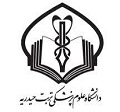(2020) شیوه های فرزند پروری مادران و ارتباط آن با مشکلات هیجانی- رفتاری کودکان مبتلا به اختلال طیف اوتیسم مراجعه کننده به مرکز اوتیسم دانشگاه علوم پزشکی تبریز. Journal of Torbat Heydariyeh University of Medical Sciences. pp. 11-22.
|
Text
thums-jms-v7n4p11-fa.pdf Download (291kB) |
Persian Abstract
زمینه و هدف: شیوع اختلالات طیف اوتیسم در ایران در حال افزایش بوده و مادران این کودکان با چالش­ های بسیاری مواجه می­ باشند. یکی از مهم ترین عوامل تاثیرگذار بر مشکلات هیجانی-رفتاری در کودکان، سبک فرزندپروری والدین خصوصا مادر می­ باشد. هدف مطالعه حاضر بررسی ارتباط شیوه­ های فرزند پروری مادران کودکان مبتلا به اختلالات طیف اوتیسم با مشکلات هیجانی رفتاری این کودکان می­ باشد. روش­ ها: این مطالعه توصیفی- همبستگی در سال 1397 بر روی 146 نفر از مادران کودکان مبتلا به اختلال طیف اوتیسم (4 تا 13 ساله) مراجعه­ کننده به مراکز اوتیسم وابسته به دانشگاه علوم پزشکی تبریز انجام گرفت. روش نمونه­ گیری به روش در دسترس بود. برای جمع آوری اطلاعات از پرسشنامه های استاندارد شیوه های فرزند پروری بامریند و پرسشنامه مشکلات رفتاری و هیجانی کودکان  (Child Behavior Checklist) استفاده شد. داده­ ها با استفاده از نرم افزار SPSS ورژن 21 و با روش ­های فروانی، درصد و همبستگی پیرسون مورد تجزیه و تحلیل قرار گرفت. نتایج: یافته ­ها نشان داد که شیوه غالب فرزندپروری مادران مقتدرانه است. همچنین، همه کودکان دارای مشکلات هیجانی رفتاری هستند، اما 63 کودکان در محدوده غیر­بالینی و 37 کودکان در محدوده بالینی قرار دارند. فقط شیوه فرزند پروری مقتدرانه با خرده مقیاس­ های اضطراب، مشکلات جسمانی و رفتار پرخاشگری ارتباط آماری معنی­ دار داشت(p<0/05). نتیجه­ گیری: با توجه به میزان بالای مشکلات هیجانی رفتاری و ارتباط بین برخی خرده مقیاس­ های آن با شیوه­ های فرزندپروری، لازم است در خصوص ماهیت و ویژگی­ های اختلالات طیف اوتیسم به مادران آن­ها آموزش کافی داده شود تا اطلاعات و ادراک آنان از رفتارهای مشکل ساز فرزندشان افزایش یابد و با شناخت و آگاهی بیشتری با فرزندشان برخورد کنند. در این راستا برگزاری برنامه­ های آموزشی مدون والدمحور و خانواده محور برای این گروه از مادران پیشنهاد می گردد.
Title
Maternal parenting styles and its relationship with emotional-behavioral problems in children with autism spectrum disorder referred to the autism center of Tabriz university of medical sciences
Abstract
Background & Aim: The prevalence of autism spectrum disorders in Iran is increasing and mothers of these children are exposed to parental challenges. One of the most important determinants of emotional behavior problems in children is the parenting style of parents, especially the mother. So, the purpose of this study was to investigate the relationship between parenting styles in mothers of children with autism spectrum disorders and emotional behavioral problems in these children. Methods: This descriptive correlational study was performed on 146 mothers of children with autism spectrum disorder (4-13 years old) referred to autism centers in Tabriz University of Medical Sciences. The sampling method was available. Standard questionnaires of Baumriand,s parenting styles and Child Behavior Checklist (CBCL) questionnaire were used for data collection. Data were analyzed using frequency and relative frequency, Pearson correlation and multiple linear regression in SPSS 21. Results: The findings showed that the dominant parenting style of mothers is authoritative. Also, all children have emotional-behavioral problems, but 63 of children are in non-clinical range and 37 of children are in clinical range. Only authoritative parenting style had a statistically significant relationship with the subscales of anxiety, physical problems, and aggressive behavior(p<0.05). Conclusion: Given the high prevalence of emotional-behavioral problems and the relationship between some of its subscales with parenting styles, it is necessary to educate mothers about the nature and characteristics of autism spectrum disorders. This would improve their understanding of problematic behaviors of their children, thus, they can act with more awareness and cognition. In this regard, it is recommended to run parent-centered and family-centered educational programs for this group of mothers.
| Item Type: | Article |
|---|---|
| Keywords: | Parenting, Mothers, Autism Spectrum Disorder, Child, Emotional Behavioral Problems,Tabriz |
| Page Range: | pp. 11-22 |
| Journal or Publication Title: | Journal of Torbat Heydariyeh University of Medical Sciences |
| Journal Index: | Not Index |
| Volume: | 7 |
| Number: | 4 |
| Publisher: | Torbat Heydariyeh University of Medical Sciences |
| Depositing User: | پریسا مرادی |
| URI: | http://eprints.thums.ac.ir/id/eprint/2185 |
Actions (login required)
 |
View Item |



